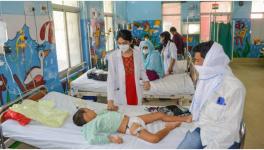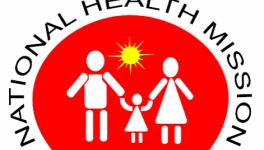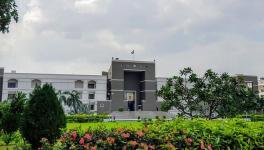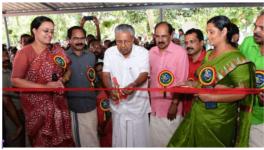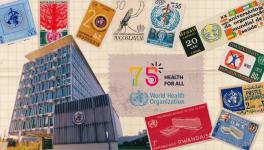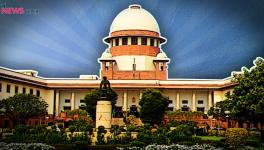Three-Day Capacity Building Workshop Organised to Shed Light on Caste and Gender Bias in Health Sector
Kolkata: As part of the celebration of 80 years of PRC, a three-day workshop and the Amit Sengupta memorial lecture have been organised with the intent to shed light on issues such as caste and gender bias in the health sector. The workshop started on Friday and will be concluded on Sunday.
In the inaugural session – which was presided over by Dr Dulalchandra – Asha Mishra, general secretary of All India People’s Science Forum, addressed the gathering with revolutionary greetings. Mishra commended PRC for continuously working in India for the people for over 80 long years. She emphasised that such a difficult task could be accomplished only with a concrete and matured political understanding of what is to be done for the people. Members of the progressive movement in West Bengal stood by people in every natural calamity – be it floods, cyclones, earthquakes, or any other disaster. Recalling the recent experience with COVID-19, she underscored the importance of being with people in trying times.
Emphasising the need for such a workshop on health rights, she said that although India is termed as a self-reliant country, there are so many inequalities in access to health and a wide gap between the rich and the poor. “The self-reliance story applies to only a small proportion of the population while the rest of the population is deprived and marginalised. We have to ensure that the 80% population, which does not have access to any healthcare, is able to fight for their right to access to health and healthcare facilities,” said Mishra.
In 1978, under the Alma Ata declaration, various countries came together and fixed certain goals towards the achievement of ‘Health for All’. In the year 2000, national and international peoples’ movements got together in Dhaka, Bangladesh to assess whether these goals have been achieved and to put pressure on governments to work towards achieving these goals.
Remembering Dr Amit Sengupta, Mishra mentioned that he spent more than 30 years of his life on issues related to people’s science and people’s health. Dr Sengupta is one of the key people who were instrumental in strengthening the people’s health movement in India and globally. In the year 2000, a health assembly was organised in Kolkata which resulted in the formation of Jan Swasthya Abhiyan and subsequently the first international People’s Health Assembly in Dhaka.
Mishra explained that the policies of liberalisation, privatisation and globalisation wreaked havoc in the lives of the people and that in 2022, the situation is the same and most of the promises made under Alma Ata have not been realised. Mishra concluded by saying that the workshop aimed to help with people’s understanding of the ‘right to health’.
One of the important issues expected to be highlighted during the workshop will be the role of social structures like gender, class, and caste in creating health inequalities and working as barriers to health rights. The discussions will attempt to identify various political and economic factors that limit access to power to a few people.
The workshop will also focus on the private sector and privatisation as barriers to health rights. There will be an extensive discussion on various national and international issues of access to medicines, including drug price regulation and intellectual property rights. The workshop will advocate strengthening comprehensive primary care as an alternative to the neo-liberal version of Universal Health Coverage. One of the sessions is also scheduled to address the role of media in shaping the health discourse.
On the inaugural day of the workshop, Prof Satyajit Chakraborty talked about the context of PRC formation, which took place after 19 organisations and people from all walks of life came together. The organisation continues to serve the most underprivileged people. During the 1970s, other health organisations were formed throughout Bengal. Many renowned scientists like Dr Amiyo Hati took up the task to lead Jana Swasthya Samity.
Chakraborty also commemorated Dr Amit Sengupta and discussed his contribution to bringing the science and health movement to the people. He also recalled how student communities from various marginalised groups came together to form the Student Health Home in the 1970s and continued to provide crucial health care to deprived sections of society.
Adsa Fatima of the SAMA Resource Group for Women spoke about food security, shelter, social security, and minimum wage and its intersection with gender and caste as social determinants in the health sector. She also pointed out that gender-based aspects of communal violence, caste-based violence, domestic violence, and violence at the workplace are reasons for inequity in the health sector. The other determinants are patriarchy, caste, conservative outlook, capitalism, and globalisation with features like structural adjustment – which has come in the way of all Indians having equitable access to health services.
“Health is a political issue,” she commented and pointed out that the disproportionate burden of caregiving at home lies on women. The onus of family planning is also put on women with women’s sterilisations being much more prevalent than men’s sterilisations. Fatima also criticised the government for hiding behind the co-morbidity factor as an alibi for covid deaths.
On the political economy of health
Addressing the delegates like doctors, health activists, student activists, and Asha workers of West Bengal, Bihar, Jharkhand and Assam, noted Professor Indranil of OP Jindal University elaborated on the political economy fuelling the present international medical trade and pointed to huge profit made by companies like Pfizer and Moderna during the pandemic. “Inequality in the post-covid period is increasing,” he said citing a NewsClick report that listed companies in December 2020 that had made more than $ 1620.61 billion in profit.
He went on to define the political economy as a specific understanding of the complex interlinkages between medical science as a form of human activity and particular characteristics of the society with which it is protected.
The workshop also witnessed a session by LGBTQ+ activist Anindya Hazra who said that until 1953 in the country, the Hijda (eunuch) community was stigmatised and treated as a criminal community. He also shared his experience as an LGBTQ+ activist.
In his speech on understanding the concepts of health Dr Fuad Halim presented an elaborate take on the Alma Ata declaration to the information asymmetry plaguing this sector. He also argued that rich nations have kept their social security network intact. He also rued the fact that while the Alma Ata declaration in 1973 was about ‘Health for All’ by the year 2000; however, unable to achieve that, a new term called millennium development goal was coined.
Get the latest reports & analysis with people's perspective on Protests, movements & deep analytical videos, discussions of the current affairs in your Telegram app. Subscribe to NewsClick's Telegram channel & get Real-Time updates on stories, as they get published on our website.









